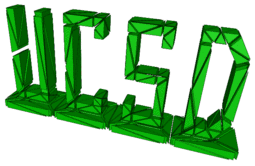|
|
Math 259C (Geometrical Physics)
Course Topics: Mathematical and Numerical General Relativity
Instructor: Prof. Michael Holst
(5739 AP&M, mholst@math.ucsd.edu)
Term: Winter 2009
Lecture: 9:30a-10:50a Tu-Th, APM 7421
Class webpage:
http://ccom.ucsd.edu/~mholst/teaching/ucsd/259c_s09
Textbook(s):
- M. Alcubierre,
Introduction to 3+1 Numerical Relativity,
Oxford, 2008.
- T. Frankel,
The Geometry of Physics,
Cambridge, 2004, second edition.
CATALOG DESCRIPTION:
259A-B-C. Geometrical Physics (4-4-4)
Manifolds, differential forms, homology, deRham’s theorem.
Riemannian geometry, harmonic forms. Lie groups and algebras,
connections in bundles, homotopy sequence of a bundle, Chern classes.
Applications selected from Hamiltonian and continuum mechanics,
electromagnetism, thermodynamics, special and general relativity,
Yang-Mills fields.
Prerequisite: graduate standing in mathematics, physics, or engineering,
or consent of instructor.
GRADES, EXAMS, DATES:
Your grade in the course is based on attending the lectures and
participating in the class.
ANNOUNCEMENTS, NOTES, ETC:
Books, papers, and notes that I will steal from throughout the quarter:
- Background: Geometric Mechanics, Geometric PDE, Sobolev Spaces on Manifolds
- E. Hebey,
Sobolev Spaces on Riemannian Manifolds,
Springer, 1996.
- R. Palais,
Seminar on the Atiyah-Singer index theorem,
Princeton University Press, Princeton, 1965.
- S. Rosenberg,
The Laplacean on a Riemannian Manifold,
London Mathematical Society, 1997.
- T. Aubin,
Some Nonlinear Problems in Riemannian Geometry,
Springer, 1998.
- P. Szekeres,
A Course in Modern Mathematical Physics,
Cambridge, 2004.
- M. Holst,
Some (pretty rough) Notes
on Calculus in Banach Spaces, Variational Methods, and Mechanics.
- Mathematical General Relativity (Evolution Equations and Constraints)
- Y. Choquet-Bruhat,
General Relativity and the Einstein Equations,
Oxford, 2008.
- A. Rendall,
Partial Differential Equations in General Relativity,
Oxford, 2008.
- R. Wald,
General Relativity,
University of Chicago Press, 1984.
- S. Hawking and G. Ellis,
The Large Scale Structure of Space-Time,
Cambridge, 1973.
- N. Straumann,
General Relativity with Applications to Astrophysics,
Springer, 2004.
- M. Holst, G. Nagy, and G. Tsogtgerel,
Rough Solutions of the Einstein Constraints
on closed manifolds without near-CMC conditions.
Accepted for publication in
Comm. Math. Phys..
(Paper at arXiv:0712.0798 [gr-qc])
(Paper at CMP)
- M. Holst, G. Nagy, and G. Tsogtgerel,
Far-from-constant mean curvature solutions of Einstein's constraint
equations with positive Yamabe metrics.
Physical Review Letters, Vol. 100 (2008), No. 16, pp. 161101.1-161101.4.
(Paper at arXiv:0802.1031 [gr-qc])
(Paper at APS)
- Numerical Methods and Approximation Theory for Geometric Elliptic PDE
- Numerical Methods and Approximation Theory for Geometric Evolution PDE
- J. Hesthaven and T. Warburton,
Nodal Discontinuous Galerkin Methods,
Springer, 2008.
SCHEDULE FOR THE LECTURE TOPICS:
The overall plan is to build some background in geometric PDE and
mathematical general relativity, and then develop mathematical techniques
in nonlinear approximation to build provably good numerical methods for
solving the various types of elliptic and evolution PDE systems that arise.
Our focus will be to understand what the key mathematical and approximation
issues and obstacles are in the study of the constraint and evolution equations
in general relativity. We will also examine some related problems in
geometric flows along the way.
We will make the course as self-contained as possible, which will require
that we develop some basic knowledge in four areas:
- Background: Geometric Mechanics, Geometric PDE, Sobolev Spaces on Manifolds
- Mathematical General Relativity (Evolution Equations and Constraints)
- Numerical Methods and Approximation Theory for Geometric Elliptic PDE
- Numerical Methods and Approximation Theory for Geometric Evolution PDE
Above I have listed the main sources (books, paper, notes) that I will use to
develop some of the material in the lectures.
The specific topics for the lectures will evolve as the quarter proceeds,
based on how the interests of the participants and the lecturer evolve.
|
